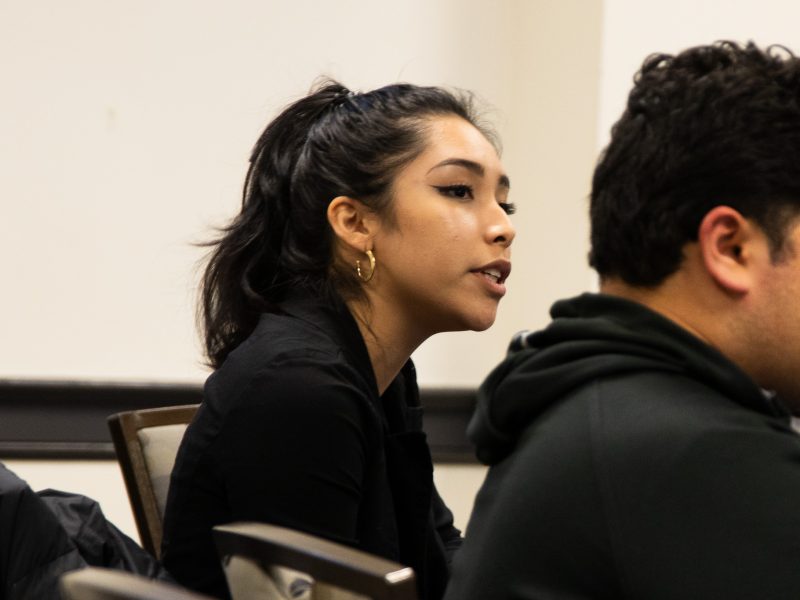In the wake of the deadly south Florida high school shooting on Wednesday, the University of Maryland’s Behavior Evaluation and Threat Assessment Team has continued to stress the importance of reporting concerning behavior on the campus.
The team evaluates reports about students who are concerning, disruptive or threatening, and its seven members bring expertise from various fields such as public safety, mental health and student conduct, according to its website. Some of the team’s members include Mental Health Services Director Marta Hopkinson and Student Conduct Director Andrea Goodwin.
On Wednesday, 17 students and faculty were killed in one of the deadliest school shootings in U.S. history at Marjory Stoneman Douglas High School in Parkland, Florida. The FBI acknowledged Friday that it failed to follow protocol after receiving concerns about the alleged shooter, 19-year-old Nikolas Cruz.
Freshman economics and government and politics major Amit Dadon, who attended the Parkland high school, was studying in his dorm when he heard about the shooting. His house is five minutes from the school, he said.
[Read more: UMD Police are using simulation training to prepare for active shooter situations]
“One of my friends [at the high school], she texted that there’s an active shooter on campus, and that [they were] all hiding in the closet together,” Dadon said. “At first when I saw it I thought that it was a mistake, that it was just a false alarm, that it wasn’t actually our school. And then it finally hit that this is home.”
During the past few days, Dadon has seen his home community band together on live television in response to the shooting.
“There’s students from my school, people that I had seen in the halls every day, talking on CNN, talking on MSNBC, and it makes me so proud to be from the same school as these kids,” Dadon said. “They’re the future leaders, and they’re setting the tone, that this will never happen again, that we will never let it happen again.”
The Parkland shooting is the latest deadly massacre in a school, joining the 2007 Virginia Tech shooting, where a gunman killed 32 people, and the 2012 Sandy Hook Elementary School shooting in Newtown, Connecticut, where 20 children and six adults were murdered, as among the worst in U.S. history. Congressional inaction has prompted outrage, particularly from students who survived the south Florida shooting, and many are questioning when and where the next rampage will be.
The BETA Team formed in 2005 and reviews between 100 and 140 reports from students, staff and faculty each year, BETA Team case manager Maria Lonsbury said, adding that the vast majority of reports pertain to absenteeism from class, general behavior concerns and mental health issues. While some reports contain the perception of a threat, “it is rare that our students present actual threatening behavior,” Lonsbury said.
Some examples of alarming behavior, according to the BETA Team’s website, include “being disorderly, disruptive or verbally aggressive,” expressing uncontrollable anger and threatening physical harm.
A 2004 U.S. Secret Service and Education Department study analyzed 37 incidents of targeted school violence involving 41 attackers ranging between 1974 and 2000. In 81 percent of these incidents, at least one person had information on the planned attack beforehand, according to the study.
The BETA Team has monitored the events of the Florida shooting and other incidents in the hope that it can gain a better understanding of how to prevent such tragedies, and continues to use its standard evaluation process whenever reports are submitted, said John Zacker, BETA Team chair and assistant vice president for student affairs.
When the team receives a report, it performs a preliminary evaluation, analyzing the circumstance of the report and what resources it should consider. Afterward, the team usually reaches out to the party that filed the report in order to discuss future steps, Zacker said.
“Many times, the school tragedies end up with an individual who might be alienated from their social setting, ostracized in some way, shape or form,” Zacker said. “When that happens, it can, unfortunately, turn bad.”
Cruz’s social media accounts were filled with pictures and comments showing he had an obsession with guns. He was expelled from Marjory Stoneman Douglas High School for disciplinary reasons. And in September, a YouTube account with his name commented: “Im going to be a professional school shooter.”
Zacker and the BETA Team emphasize “early intervention” and ensuring troubled individuals quickly get adequate support resources, such as the Counseling Center’s clinical services.
“What we want to try to do is reach out and talk to those people who might be acting in a manner that’s out of the ordinary, we don’t want to shun them and push them aside, further alienating them,” Zacker said. “The sooner we can hear about a situation, the better. Don’t let things get out of hand by not saying anything.”
University Police are readily available and equipped with body armor, an armored rescue vehicle and a gunshot detection system in case of an active shooter incident, University Police Chief David Mitchell said. Mitchell described active shooting incidents as “the number one threat that keeps [him] up at night.” With this in mind, Mitchell also stressed that it is necessary for students to report any concerning behavior.
[Read more: Several universities have gunshot-detection technology. UMD might follow suit.]
“When you see and hear continued talk and red flags that continue to pop up on someone, clearly there’s something amiss here,” Mitchell said. “You don’t need to be a psychologist to know that someone is acting differently.”
Sophomore public policy major Gabriella Epstein expressed her sympathy to the victims of the south Florida shooting. She believes services like the BETA Team are important in establishing a proper support network on the campus that can prevent active shooter incidents.
“It’s just really important to be in tune with social dynamics, and to try to minimize bullying and mistreatment of students who really stand out,” Epstein said. “Besides that, I think it’s really important to have a good system in terms of counseling and having people available to talk to if [someone is] having issues.”
Concerning, disruptive or threatening behavior can be reported to the BETA Team through an online form, and in more immediate situations, individuals are advised to contact University Police at 301-405-3555.



